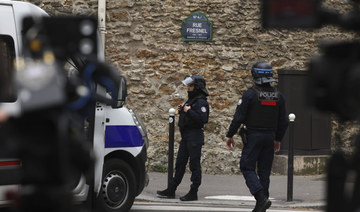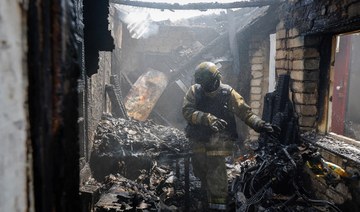BERLIN: Chastened by their worst result since 1949 in September’s national election, Chancellor Angela Merkel’s conservatives are hoping for victory in a regional vote on Sunday to strengthen their hand in thorny three-way coalition talks in Berlin.
While victory in the Lower Saxony region might strengthen Merkel’s position within her party, a conservative failure to emerge as the strongest party could prompt talk of weakening authority and possible eventual succession, said Berlin-based political expert Gero Neugebauer.
Lower Saxony, an agricultural heartland and Germany’s second biggest region, offers Merkel’s Christian Democrats (CDU) the prospect of a morale boost as they seek to cobble together an unprecedented “Jamaica” national coalition with the liberal Free Democrats (FDP) and Greens.
The road to such an alliance, named after the Caribbean nation as the parties’ colors match those of its flag, is littered with disputes on everything from migrants to tax and the environment. It would be the clunky coalition’s federal debut if talks, due to start next week, prove a success.
Carsten Nickel, deputy research director at Teneo Intelligence, said Sunday’s election — which polls show is set to be a neck-and-neck contest between the CDU and the rival Social Democrats (SPD) — would determine momentum going into national coalition negotiations.
“If Merkel managed to steal that state from the SPD, it would probably be a little bit of a boost,” he said. “It would probably be slightly easier for her to argue internally for the required compromise and for striking the deals and so on that will be required over the next couple of weeks.”
NECK-AND-NECK
Merkel’s CDU and their Bavarian sister party (CSU) removed a major stumbling block to coalition talks on Sunday by ending their long-running dispute over migrant policy with an agreement to limit the number of migrants coming to Germany.
Merkel’s conservative bloc won 33 percent in September’s national election, losing 8.5 points compared with 2013, as voters upset with Merkel’s 2015 decision to open the borders to more than a million migrants abandoned the party. The result effectively brought an end to the existing national coalition with the SPD, who also performed badly.
The election in the northern state, home to carmaker Volkswagen, was called after a lawmaker in the Greens party — junior coalition partner to the SPD there — defected to the CDU, robbing the ruling alliance of its one-seat majority.
The CDU enjoyed a 12-point lead over the SPD in August at the start of the campaign, which has focussed on regional issues such as education and also an influx of migrants to Germany over the last two years, but has since shed support.
The latest INSA poll showed the SPD on 33 percent, closely followed by the CDU on 32 percent. The Greens and FDP were both on 10 percent while the anti-immigrant Alternative for Germany (AfD) was on 7 percent, putting it on course to win seats in Lower Saxony’s state assembly for the first time.
As tricky coalition talks loom, Merkel hopes for regional poll boost
As tricky coalition talks loom, Merkel hopes for regional poll boost

Defense Secretary Lloyd Austin resumes duty after undergoing procedure at Walter Reed

WASHINGTON: Defense Secretary Lloyd Austin underwent a medical procedure at Walter Reed National Military Medical Center Friday evening and has resumed duty after temporarily transferring power to his deputy, Pentagon press secretary Maj. Gen. Pat Ryder said in a statement.
Austin is continuing to deal with bladder issues that arose in December following his treatment for prostate cancer, Ryder said.
The procedure was successful, elective and minimally invasive, “is not related to his cancer diagnosis and has had no effect on his excellent cancer prognosis,” the press secretary said.
Austin transferred authority to Deputy Secretary of Defense Kathleen Hicks for about two-and-a-half hours while he was indisposed, the Pentagon said.
The Pentagon chief returned home after the procedure. “No changes in his official schedule are anticipated at this time, to include his participation in scheduled Memorial Day events,” Ryder said.
Austin, 70, has had ongoing health issues since undergoing surgery to address a prostate cancer diagnosis. He spent two weeks in the hospital following complications from a prostatectomy. Austin faced criticism at the time for not immediately informing the president or Congress of either his diagnosis or hospitalization.
Austin was taken back to Walter Reed in February for a bladder issue, admitted to intensive care for a second time and underwent a non-surgical procedure under general anesthesia at the time.
The Pentagon has notified the White House and Congress, Ryder said.
More than 300 buried in Papua New Guinea landslide, local media says
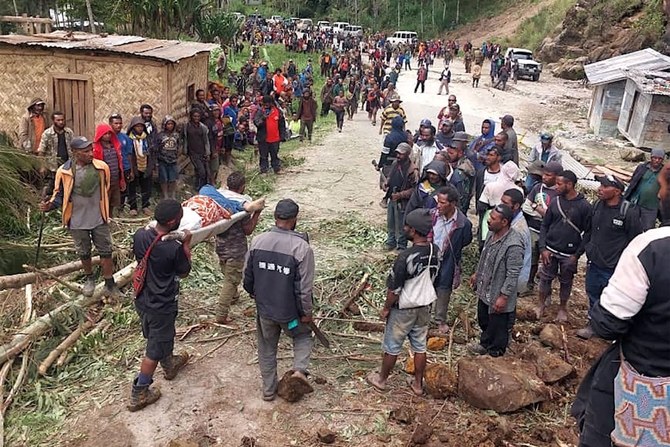
- Hundreds are feared dead in the landslide that hit Kaokalam village
SYDNEY: More than 300 people and over 1,100 houses were buried by a massive landslide that levelled a remote village in northern Papua New Guinea, local media reported on Saturday.
Hundreds are feared dead in the landslide that hit Kaokalam village in Enga Province, about 600 km (370 miles) northwest of capital Port Moresby, around 3 a.m. on Friday (1900 GMT on Thursday).
The landslide in the Pacific nation north of Australia buried more than 300 people and 1,182 houses, the Papua New Guinea Post Courier said, citing comments from a member of the country’s parliament, Aimos Akem. Akem did not immediately respond to Reuters request for comment via social media.
The Australian Broadcasting Corp. reported on Saturday that four bodies had been retrieved from the area after emergency teams reached the sparsely populated area, where the death toll is expected to rise.
The landslide has blocked highway access, making helicopters the only way to reach the area, the broadcaster reported.
Social media footage posted by villager Ninga Role showed people clambering over rocks, uprooted trees and mounds of dirt searching for survivors. Women could be heard weeping in the background.
Prime Minister James Marape has said disaster officials, the Defense Force and the Department of Works and Highways were assisting with relief and recovery efforts.
French court sentences 3 Syrian officials to life in prison in absentia for war crimes
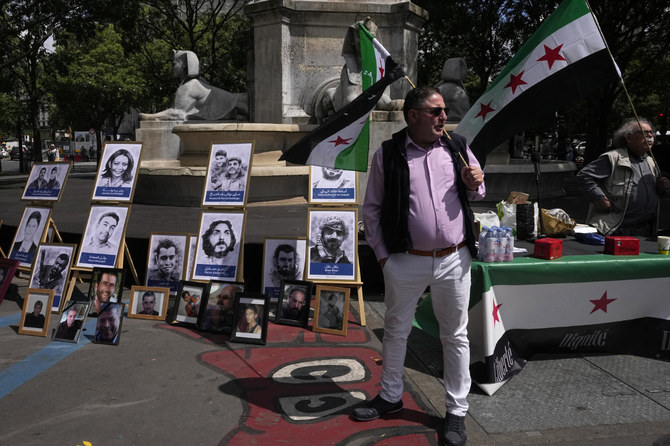
- The trial focused on the officials’ role in the alleged 2013 arrest in Damascus of Mazen Dabbagh, a Franco-Syrian father, and his son Patrick, and their subsequent torture and killing
- Former intelligence officials Ali Mamlouk, Jamil Hassan, and Abdel Salam Mahmoud are the most senior Syrian officials to go on trial in a European court over crimes allegedly committed during the country’s civil war
PARIS: A Paris court sentenced three high-ranking Syrian officials in absentia to life in prison Friday for complicity in war crimes in a landmark case against the regime of Syrian President Bashar Assad and the first such case in Europe.
The trial focused on the officials’ role in the alleged 2013 arrest in Damascus of Mazen Dabbagh, a Franco-Syrian father, and his son Patrick, and their subsequent torture and killing. The four-day trial featured harrowing testimonies from survivors and searing accounts from Mazen’s brother.
Though the verdict was cathartic for plaintiffs, France and Syria do not have an extradition treaty, making the outcome largely symbolic. International arrest warrants for the three former Syrian intelligence officials — Ali Mamlouk, Jamil Hassan, and Abdel Salam Mahmoud — have been issued since 2018 to no avail.
They are the most senior Syrian officials to go on trial in a European court over crimes allegedly committed during the country’s civil war.
The court proceedings came as Assad has started to shed his longtime status as a pariah that stemmed from the violence unleashed on his opponents. Human rights groups involved in the case hoped it would refocus attention on alleged atrocities.
Clémence Bectarte, the Dabbagh family lawyer from the International Federation for Human Rights, said the verdict was the “first recognition in France of the crimes against humanity of the Syrian regime.”
“It is a message of hope for all Syrian victims who are waiting for justice. It is a message that must be addressed to states so that they do not normalize their relations with the regime of Bashar Assad,” she said.
The trial began Tuesday over the alleged torture and killing of the French-Syrian father and son who were arrested at the height of Arab Spring-inspired anti-government protests. The two were arrested in Damascus following a crackdown on demonstrations that later turned into a brutal civil war, now in its 14th year.
The probe into their disappearance started in 2015 when Obeida Dabbagh, Mazen’s brother, testified to investigators already examining war crimes in Syria.
Obeida Dabbagh and his wife, Hanane, are parties to the trial along with non-governmental organizations. They testified in court on Thursday, the third day of the trial.
Obeida Dabbagh said he hoped the trial would set a precedent for holding Assad accountable. “Hundreds of thousands of Syrians have died. Even today, some live in fear and terror,” he said.
Despite the defendants’ absence, the trial’s significance was underscored by Brigitte Herremans, a senior researcher at the Human Rights Center of Ghent University. “It’s very important that perpetrators from the regime side are held accountable, even if it’s mainly symbolic. It means a lot for the fight against impunity,” she said.
Some 45,000 Rohingya have fled fighting in Myanmar: UN
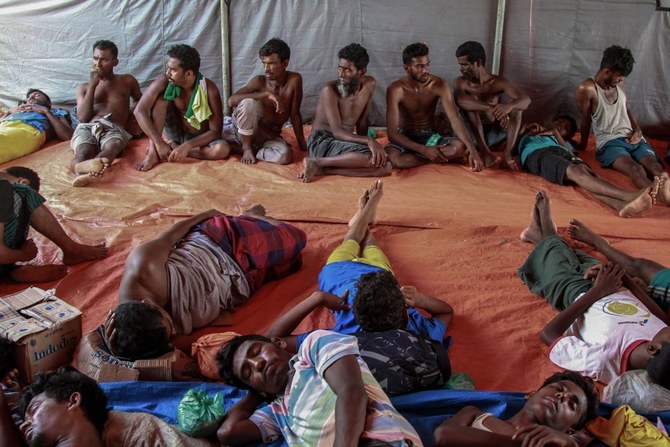
GENEVA: The United Nations warned on Friday that escalating fighting in conflict-torn Myanmar’s Rakhine State had forced around 45,000 minority Rohingya to flee, amid allegations of killings and burnings of property.
“Tens of thousands of civilians have been displaced in recent days by the fighting in Buthidaung and Maungdaw townships,” UN rights office spokeswoman Elizabeth Throssell told reporters in Geneva.
“An estimated 45,000 Rohingya have reportedly fled to an area on the Naf River near the border with Bangladesh, seeking protection,” she said.
Clashes have rocked Rakhine since the Arakan Army (AA) attacked forces of the ruling junta in November, ending a ceasefire that had largely held since a military coup in 2021.
The AA says it is fighting for more autonomy for the ethnic Rakhine population in the state, which is also home to around 600,000 members of the persecuted Rohingya Muslim minority.
Hundreds of thousands of Rohingya fled Rakhine in 2017 during a crackdown by the military that is now the subject of a United Nations genocide court case.
“Over a million Rohingya are already in Bangladesh, having fled past purges,” Throssell pointed out.
UN rights chief Volker Turk was urging Bangladesh and other countries “to provide effective protection to those seeking it, in line with international law, and to ensure international solidarity with Bangladesh in hosting Rohingya refugees in Myanmar,” she said.
James Rodehaver, head of the rights office’s Myanmar team, described the horrifying situation many were fleeing from.
He said his team had received testimonies and seen satellite images, online videos and pictures indicating that Buthidaung town had been “largely burned.”
“We have received information indicating that the burning did start on May 17... two days after the military had retreated from the town... and the Arakan Army claimed to have taken full control of the village.”
He stressed that the UN rights office was still working to corroborate that information, to clearly establish “who were the perpetrators.”
One survivor had described seeing dozens of dead bodies as he fled Buthidaung, while another had said he was among tens of thousands who fled the town only to find themselves blocked by the AA on the road west toward Maungdaw town.
Other survivors also said AA members had abused them and extorted money from them as they tried to make their way to Rohingya villages south of the town.
In the weeks leading up to the burning of Buthidaung, Rodehaver said the rights office had documented renewed attacks on Rohingya civilians by both AA and the military in northern Rakhine, including through air strikes.
The team had documented “at least four cases of beheadings,” he said, adding that they had determined with a high level of confidence that those were carried out by the AA.
Beyond Buthidaung, Throssell warned of “clear and present risks of a serious expansion of violence.”
She pointed to the beginning of a battle for Maungdaw town, where the military has outposts and where a large Rohingya community lives.
“In this appalling situation, civilians are once more victimized, killed, their properties destroyed and looted, their demands for safety and security ignored,” she said.
“They are again forced to flee their homes in a recurring nightmare of suffering.”
Zelensky says Ukrainian forces now control area where Russia pushed into Kharkiv region
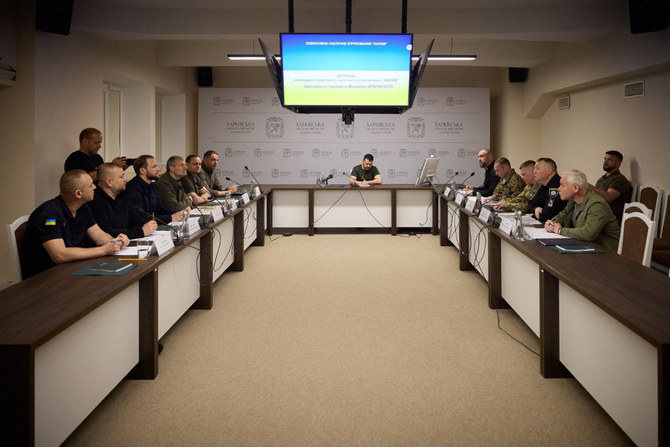
- A late-night report by the General Staff said Ukrainian forces had repelled 10 Russian attacks in the area, including around Vovchansk.
- Russian forces were using less infantry around Vovchansk and instead firing from a distance, with limited accuracy.
President Volodymyr Zelensky said on Friday that Ukrainian forces had secured “combat control” of areas where Russian troops staged an incursion this month in northern parts of Kharkiv region.
“Our soldiers have now managed to take combat control of the border area where the Russian occupiers entered,” Zelensky said in his nightly video address.
Zelensky’s comments, after holding a meeting of military and regional officials in Kharkiv, Ukraine’s second largest city, appeared to be at variance with comments by Russian officials.
Viktor Vodolatskiy, a member of Russia’s State Duma lower house of parliament, was quoted by Tass news agency as saying Russian forces controlled more than half the territory of the town of Vovchansk, 5 km (three miles) inside the border.
Vodolatskiy was quoted as saying that once Vovchansk was secured, Russian forces would target three cities in Ukraine’s eastern Donetsk region — Sloviansk, Kramatorsk and Pokrovsk.
Reuters was unable to verify independently battlefield accounts from either side.
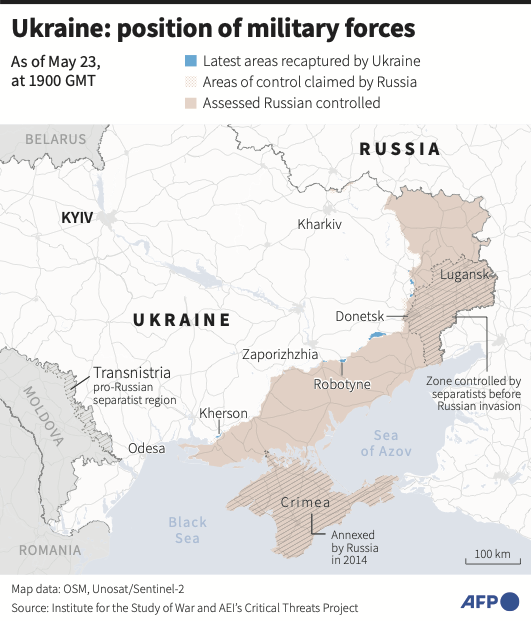
Russian forces pushed into border regions of Ukraine’s Kharkiv region this month and Russia’s Defense Ministry said they had secured control of about 12 settlements.
Zelensky and other Ukrainian officials had been reporting success in “stabilising” the area.
The Ukrainian military’s General Staff, in its evening report on Friday said the situation in Vovchansk was “tense but controlled by the defense forces.”
“The Russian army today launched air terror against this town — eight guided bombs hit the town,” it said. Attacks were launched on at least two other settlements north of Kharkiv.
A late-night report by the General Staff said Ukrainian forces had repelled 10 Russian attacks in the area, including around Vovchansk.
It also noted Russian forces had achieved “partial success” in areas near Kupiansk, further east in Kharkiv region, and the Pokrovsk sector where heavy fighting has been taking place further south in Donetsk region.
Ukrainian military bloggers said Ukrainian troops had been holding their ground around Vovchansk and Russian forces were using less infantry in the area and instead firing from a distance, with limited accuracy.






